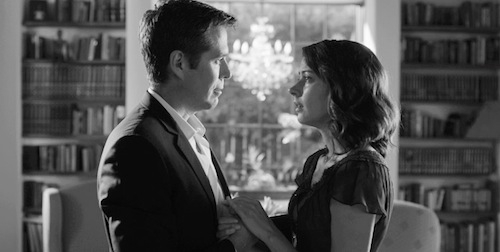Much Ado About Nothing

From the so-called “greatest plumber of human nature” (I’ll let you decide which writer that describes) comes a comedy about romance. But to tag even this version of Much Ado About Nothing as a rom-com would be to defile its class and associate it with the charmless junk that Hollywood regularly churns out under that banner. When done right, Shakespeare is always a joy to see and hear.
For Joss Whedon, by keeping everything understated, Much Ado became the perfect tonic to the draining experience and demands of creating the major studio behemoth Avengers Assemble. Shot over 12 days in black and white, while on location in Whedon’s own home in Southern California, with the film’s cast of actors with whom Whedon has previously worked. There can’t be many films that could be made under such circumstances, let alone those that actually benefit from it. But Whedon’s unadorned approach to Much Ado works an absolute treat: it highlights the strengths of the original text, chiefly the romance of characters and the humour in the language.
For viewers who aren’t fully accustomed to the Bard’s vernacular (which has been kept), Whedon stages everything with upmost simplicity. Not that the plot is anything approaching complex. Young lovers Claudio and Hero’s nuptial bliss is impeded by the slanderous Don John (who even gets a bass-heavy musical cue to signal his malign presence), while the bickering Benedick and Beatrice tease and sass each other until finally relenting to their latent desires. Noticeably, Whedon includes an original prologue that informs us that they’ve already had relations, so their courtship now has a decidedly contemporary edge to it.
The actors are uniformly excellent but Amy Acker shines brightest as Beatrice. She possesses an irresistible mix of beauty and wit, and whereas some thesps can toil with Shakespearean lingo, Acker breezes through her scenes with consummate ease. Honourable mention should also go to Nathan Fillion who excels in the all-too-brief role of Officer Dogberry – his interrogation of Borachio and Conrade being a particular hoot.
Finally, kudos to Whedon who, clearly aware of the Elizabethan slang in the title, keeps with the play’s sexier side while never being overly explicit.
Tom Yates
Much Ado About Nothing is released nationwide on 14th June 2013.
Watch the trailer for Much Ado About Nothing here:























Facebook
Twitter
Instagram
YouTube
RSS